#the only other people I have drawn to lift simon were his ancestors and dracula (all of which are known to be unusually big and strong)
Explore tagged Tumblr posts
Text
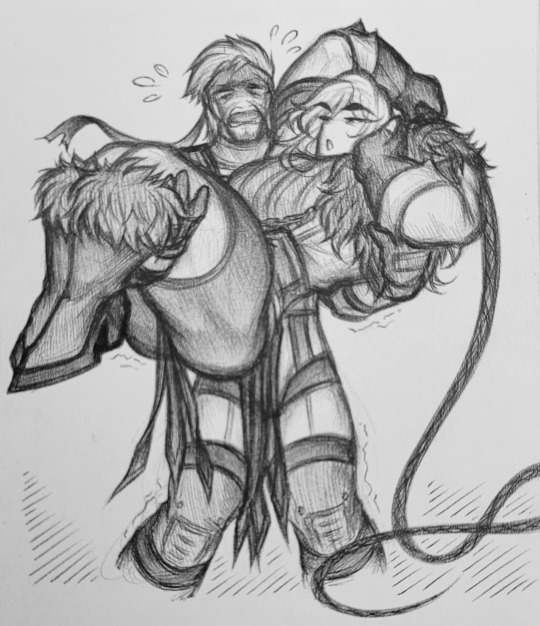
*Solid_Snake_Dying.mp3*
Enough time has passed so I can redraw this ridiculous image I remembered before. So you can carry people in DreamMix TV World Fighters I guess, maybe it's to hinder them temporarily I dunno exactly. Someone once shared a (now gone) image of Snake doing this to Simon and I had to find a way to make it even stupider. :D
#the responsibility of a big-tiddied goth friend was too much for snake#the only other people I have drawn to lift simon were his ancestors and dracula (all of which are known to be unusually big and strong)#I'm not sure all of snake's training could have prepared him for this so... we can't blame him for giving out#anyway I was thinking 'yeah I could do better on those expressions' so I did :)#doodle-daas#metal gear solid#solid snake#castlevania#simon belmont#dreammix tv world fighters#anti netflixvania
53 notes
·
View notes
Text
SP Influences: The Case of Charles Dexter Ward and The Haunted Palace
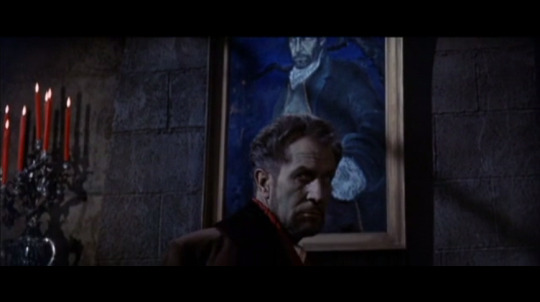
CONTENT WARNING FOR DISCUSSION OF RAPE (NOT JUST THE FANTASY METAPHOR KIND) AND SLAVERY. ALSO SPOILER WARNING FOR THE HAUNTED PALACE (1963), THE CASE OF CHARLES DEXTER WARD, AND BOTH THE FIRST AND FINAL ARC (INCLUDING THE ENDING) OF STRANGE PARADISE.
Although it never directly copied from other works, the 1969-70 soap opera Strange Paradise appears to have drawn inspiration from several classic works of Gothic fiction. Unlike its more famous cousin Dark Shadows (1966-71), which lifted most of its major plotlines from public-domain horror classics like Dracula and The Turn of the Screw with relatively few changes, the influence of other works on the plot and characters of Strange Paradise generally took a subtler form. Many of the early advertisements and articles promoting the serial compared its protagonist Jean Paul Desmond and villain Jacques Eloi des Mondes (both played by Colin Fox) to Dr. Jekyll and Mr. Hyde from the Robert Louis Stevenson novel, but--as Curt Ladnier has pointed out--there are only superficial similarities between the plot of the serial’s Maljardin arc and The Strange Case of Dr. Jekyll and Mr. Hyde, making the two works less similar than readers likely expected. Instead, the plot more closely resembles that of another, lesser-known story about a protagonist controlled by his evil counterpart: the 1963 Roger Corman/Vincent Price film The Haunted Palace, a loose adaptation of the H. P. Lovecraft novella The Case of Charles Dexter Ward.
The plot and characters of Strange Paradise have too much in common with those of The Haunted Palace to be mere coincidence. In particular, the character of Joseph Curwen and his characterization in the film strongly resemble the portrayal of Jacques Eloi des Mondes, enough to conclude that Curwen must have inspired his backstory and his interactions with the other characters. While it is likely that Lovecraft’s original 1927 novella The Case of Charles Dexter Ward also directly influenced the serial, there is stronger evidence for indirect influence by way of the film adaptation.
The Case of Charles Dexter Ward
The plot of The Case of Charles Dexter Ward shares a common theme with the Maljardin arc: the evil ancestor from the seventeenth century who returns from beyond the grave and assumes the identity of his lookalike descendant. In both cases, the ancestor was involved in the occult during his lifetime and reviled for his rumored diabolical activities. During his lifetime--which he used magic to prolong--Curwen practiced necromancy, tortured knowledge out of the people he resurrected before murdering them again, experimented on living people, and summoned the god Yog-Sothoth for assistance in his occult activities using spells from the Necronomicon. Two fellow warlocks named Simon Orne and Edward Hutchinson assisted him with his occult studies, and were both still alive when his descendant Charles Dexter Ward brought him back to life. In the early episodes of Strange Paradise’s Maljardin arc written by Ian Martin, Jacques is portrayed as the literal Devil: an accusation about which he often jokes. He has many supernatural abilities, including possession, manipulation of electricity, telekinesis, the ability to magically alter messages written in sand, and--most importantly--the ability to resurrect Jean Paul’s dead wife Erica (Tudi Wiggins), which is why he frees his spirit in the pilot. He has an interest in voodoo, although he himself does not appear to practice it and instead fears its power. Unlike Curwen, no accomplices of Jacques’ return from the dead in the Maljardin arc, although it is possible that Martin intended for the seventeenth-century witch Tarasca, an earlier incarnation of wealthy widow Elizabeth Marshall (Paisley Maxwell), to fulfill this role after possessing Elizabeth.[1]
But these occult matters are not the only common interest that Joseph Curwen and Jacques Eloi des Mondes share. Both character were involved in the more earthly evils of the slave trade. A merchant by trade, Curwen also bought and sold slaves, importing enormous numbers of enslaved people from Guinea into his hometown of Providence, Rhode Island in 1766. He sold few of them, however, and Lovecraft heavily implies that he used most of them in his experiments. The televised version of Strange Paradise never explicitly references slavery (although Jean Paul’s immortal servants Raxl (Cosette Lee) and Quito (Kurt Schiegl) are implied to be Jacques’ former slaves), but the non-canonical book series by Dorothy Daniels does on occasion. In the second book Island of Evil, Jean Paul lists “black gold, another name for the importation of slaves” along with piracy and brigandage as one of the sources of the des Mondes’ family fortune.[2] A flashback sequence in Island of Evil confirms the past enslavement of Raxl and Quito, as well as an African voodoo priest whom Jacques forces to turn Quito into a zombie: the closest event in the Strange Paradise expanded universe to Curwen’s experiments.
Both Jacques and Curwen also met their ends at the hands of locals. In The Case of Charles Dexter Ward, Ezra Weeden begins spying on Curwen because he suspects him of illegal activities including witchcraft. Eventually, he turns most of the prominent figures in Providence society against him and they band together to raid and destroy Curwen’s Pawtuxet farm. During the raid, Curwen dies for the first time, but only after devising a spell for his future resurrection. Likewise, in Strange Paradise, Jacques dies after the natives of Maljardin turn against him, although the trigger and cause of his death are different. When Jacques murders his wife, the princess Huaco, by pushing her off the island’s cliff, a group of natives including Raxl and the Conjure Man band together to kill Jacques using a conjure (voodoo) doll and silver pin. These weapons curse Jacques to throw himself from the cliff and keep his spirit "shackled to the Temple [of the Serpent, Raxl’s god]” until the day he tricks his descendant Jean Paul Desmond into removing the pin from the doll, thereby setting him free.
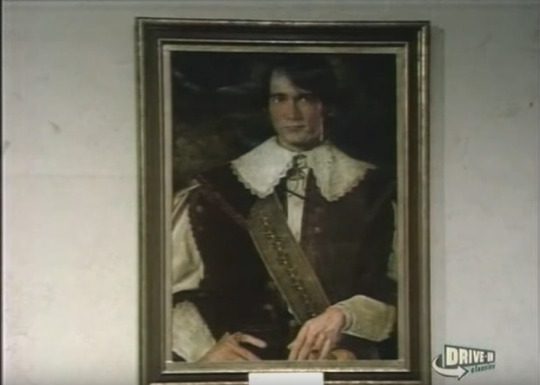

Jacques’ disappearing portrait from Strange Paradise Episode 12.
Also significantly, both The Case of Charles Dexter Ward and Strange Paradise give the evil ancestor’s portrait a prominent role in the plot. In both cases, this portrait hangs at the ancestor’s former residence and disappears either temporarily or permanently when he takes control of the man who resembles him. When Charles Dexter Ward is researching the history of Joseph Curwen, his sources lead him to an eighteenth-century townhouse at Orney Court in Ward’s hometown of Providence, Rhode Island, where Curwen settled after fleeing Salem, Massachusetts. He hires a restorator to restore the painting, has it moved to his study, and discovers some documents of Curwen’s hidden in the wall behind it. When he finally succeeds in resurrecting Curwen, the painting disintegrates into dust: an end which Curwen himself later meets. On Strange Paradise, Jacques’ oil painting sometimes disappears when he possesses Jean Paul, but the show is inconsistent about this cue from episode to episode.[3] In contrast to Curwen’s painting, Jacques’ portrait always returns after he leaves Jean Paul’s body and appears to be indestructible: when Jean Paul sets fire to Maljardin in Episode 65, the portrait survives and later re-appears in the attic at Jean Paul’s childhood home Desmond Hall in Episode 131.
In spite of these similarities, I should note that the method of resurrection differs from one work to the other. In Strange Paradise, Jacques achieves this by possessing Jean Paul: after Jean Paul frees him by removing the silver pin from the head of his effigy, Jacques’ spirit can enter and exit Jean Paul’s body at will. In The Case of Charles Dexter Ward, the title character literally resurrects Curwen, his great-great-great-grandfather, using his essential salts, after which Curwen murders him. Ward behaves as though Curwen has possessed him--he has the speech and manners of a man of the colonial period and knows extremely specific details about the history of Providence--but the pit above his right eye which Ward did not previously possess and the lack of the olive birthmark on Ward’s hip indicate a different body. When Jean Paul opens his casket in the pilot, he finds only the conjure doll and silver pin; the absence of Jacques’ body is never explained and could be for any number of reasons, which we shall not discuss here.
The Haunted Palace

A lobby card for The Haunted Palace asking the question, “What was the terrifying thing in the PIT that wanted women?” (Source)
In 1963, American International Pictures released The Haunted Palace, a loose adaptation of The Case of Charles Dexter Ward written by Charles Beaumont and directed by Roger Corman. Due to alleged executive meddling (a theme which should already be familiar to regular readers of this blog), the film was marketed as an adaptation of the Edgar Allan Poe poem of the same name, which Vincent Price quotes throughout the film. In the adaptation process, Beaumont made many changes to the source material, the most notable of which was the decision to have Curwen breed human women with the elder god Yog-Sothoth, as alluded to on the lobby card above.[4]
Though an entertaining and visually enthralling film, most of the changes made to The Haunted Palace weaken the plot. In my opinion, Beaumont added too many Hollywood horror conventions during the adaptation process, which did not always work effectively considering the unconventional source material, not to mention left many plot holes unfilled. The dated and sleazy sexual angle which he added to the film makes the cosmic horror of Yog-Sothoth less cosmic and more carnal; whether this makes him more or less frightening depends on one’s personal opinion, but I feel it contradicts his otherworldly characterization in Lovecraft’s works. For the most part, the talents of the director and the actors (especially Price, who is fabulous as always) make up for these problems, but I prefer--and highly recommend--the far more faithful radio drama adaptation by the H. P. Lovecraft Historical Society.
The most notable influence of The Haunted Palace on Strange Paradise comes from its characterizations of Charles Dexter Ward and Joseph Curwen. Despite many similarities with The Case of Charles Dexter Ward, the characterizations of both Jean Paul Desmond and Jacques Eloi des Mondes owe far more to the portrayals of the protagonist and villain in the The Haunted Palace than in its source material. In The Case of Charles Dexter Ward, neither Ward nor Curwen shows any romantic or sexual interest in women whatsoever. Lovecraft’s Ward only cares about antiquities, the local history of Providence, and the story of his ancestor; at twenty-six, he is unmarried and either asexual or simply too absorbed in his studies to pursue any romantic or sexual partner. The sexual orientation of Lovecraft’s Curwen is just as much of a mystery: although he took Eliza Tillinghast as a wife during his lifetime and their union produced a daughter, theirs was an arranged marriage for the sake of elevating Curwen’s social status within Providence society.
Both Price’s Ward and his Curwen, in contrast, show a marked interest in women. While their marriage is never outright stated to be a love match, Ward and his wife Ann (Debra Paget) appear to feel mutual love and devotion and have enough chemistry to imply a mutual sexual attraction. Like a dark mirror of Ward, Curwen shows a marked interest in the sexual and sexualized domination of women. In The Haunted Palace, the people of Arkham consider him a threat primarily because he lures local women to his palace to use in his rituals. While possessing Ward, Price’s Curwen rapes Ann--whom he later offers to Yog-Sothoth as well--and resurrects his former mistress, Hester Tillinghast (Cathie Merchant), who assists him in his sorcery in the film’s climax. If Lovecraft’s Curwen never did any similar actions, he does not mention them in his novella.
In Strange Paradise, romantic and sexual desire for women motivates both Jean Paul and Jacques. Jean Paul resurrects his ancestor neither out of an obsession with his history (as in The Case of Charles Dexter Ward) nor by accident (as in The Haunted Palace), but because Jacques’ spirit promises that, if the recently widowed Jean Paul frees him, he will restore life to his beloved wife Erica (Tudi Wiggins). Many episodes show Jean Paul mourning her death and narrating a tape-recorded journal to her, and he obsesses over protecting her cryogenically-preserved corpse from danger. Jacques romantically pursues several female characters over the course of the Maljardin arc--including Erica, her sister Dr. Alison Carr (Dawn Greenhalgh), and the wealthy widow Elizabeth Marshall (Paisley Maxwell) and her 20-year-old daughter Holly (Sylvia Feigel)--and makes many sexual innuendos about them. After resurrecting Erica, she obeys Jacques as though he were her husband and assists him by murdering most of the guests on Maljardin. This makes her character’s role comparable to that of Hester in The Haunted Palace.[5]
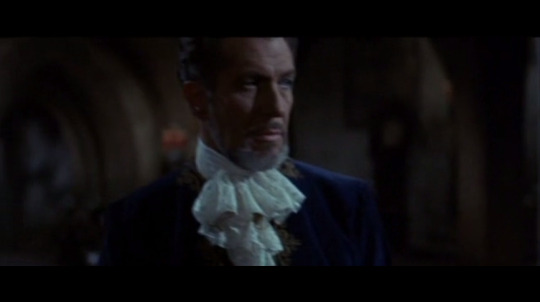
On a more superficial note, neither Jacques nor Curwen wears a costume appropriate to his era of origin. In his portrait and in flashbacks, Jacques wears a side-parted 1960s hairstyle and clothing, including a doublet and lace collar and cuffs, more appropriate for the 1630s than the late 17th century when he lived (1660-1689, according to the plaque beneath his portrait). Similarly out of place, Curwen has short hair and a beard and wears a historically inaccurate lace bib in his portrait and in the prologue at the beginning of the film. Unlike the others, this similarity is almost certainly coincidental.
An even greater similarity, however, can be found in the scene forty-five minutes into the film where Curwen speaks to Charles through his portrait.The scene occurs after the second instance of Curwen possessing him, during which he unearths Hester’s coffin and has his fellow warlocks Simon Orne (Lon Chaney, Jr.) and Jabez Hutchinson (Milton Parsons) deliver it to his cellar laboratory. Ann catches him down there and he sends her away, still possessed by Curwen. When Curwen leaves his body, they have this conversation:
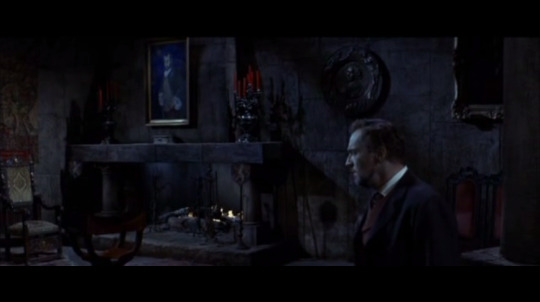
JC: (from painting) "Charles Dexter Ward…" CDW: "Leave me alone! LEAVE ME ALONE!" JC: "I will never leave you alone. Your blood is my blood, your mind is my mind, your body is my body. It will do you no good to resist me. Your efforts grow weaker every day." CDW: "No! NO!" JC: "You cannot keep me out, Ward. My will is too strong." (he possesses Ward again) "Too strong for you, Ward. Too strong for you."
Similarly, most episodes from the Maljardin arc of Strange Paradise feature at least one scene where Jean Paul communicates with Jacques’ disembodied spirit, represented by his portrait. In some scenes, they use a shot of the portrait hanging in the Great Hall; other times, they superimpose Jacques’ painted face over that of his identical descendant. One of the earliest examples of Jacques referring to them as one comes in Episode 5, when he taunts Jean Paul about his attraction to Alison. “She’s so delectable a woman. How could I--you--we--ever resist or let her go?” he says, snickering throughout. During another such conversation in Episode 27, Jacques refers to Jean Paul’s body as “our body” and commands him to rest because he is tired. In still another scene ten episodes later, he complains to Jean Paul that he is “waiting for the use of our body” as Jean Paul begs him not to “enter”; the dialogue in the scene has undertones suggestive of fantasy-metaphor rape, which Jacques’ sickeningly sweet tone of voice underscores. These are only a handful of examples of the recurring theme of Jacques viewing Jean Paul’s body as his own and seeking to dominate it completely.
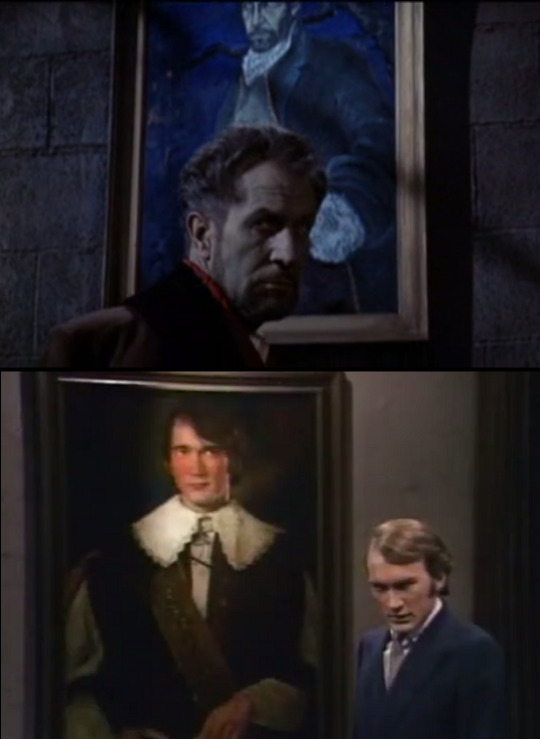
Comparison of a shot of Joseph Curwen glowering in front of his portrait with a similar one of Jean Paul glowering in front of the portrait of Jacques from Strange Paradise Episode 41.
Surprisingly, unlike in the novella, Curwen's portrait does not disintegrate when he possesses Ward. As Strange Paradise eventually started doing with Jacques’ portrait, Curwen’s portrait remains hanging until the end of the film, when it burns along with the rest of the palace (which begs the question of how it is even physically possible for stone to burn). Jacques’ portrait meets the same apparent end when Jean Paul sets fire to the château and flees Maljardin, but later returns to him at Desmond Hall, seemingly undamaged by the flames. It does not vanish for good until the final week of the show (Episodes 191-195), when a group of characters force him out of it by rubbing his brother’s ashes on his eyes and lips; this drives him out of the painting and into Jean Paul’s body, which he leaves at the end of the penultimate episode.[6]
Still another similarity comes from what is, in my opinion, Beaumont’s most ingenious change to the plot: the implication that all the human townspeople in 19th-century Arkham are reincarnations of identical people from the previous century, not just the necromancers. The same actors even portray their descendants: for example, Leo Gordon plays both Ezra and Edgar Weeden, and Frank Maxwell portrays both Dr. Marinus Willett and his ancestor Priam. Implied reincarnation figures heavily in the original outline for Strange Paradise, with Jean Paul, his sister-in-law Alison Carr, and the young heiress Holly Marshall all having dreams about previous lives on 17th-century Maljardin. Much like Jacques who possesses his descendant, Holly’s mother Elizabeth Marshall may have also been possessed by her previous incarnation, the native priestess Tarasca, under this outline, as foreshadowed in the clips in this video. The second Desmond Hall arc (Episodes 131-195), likewise, involves reincarnation from past ancestors (including the return of Jacques), but this final arc otherwise shares little in common with either The Case of Charles Dexter Ward or its adaptation.
Conclusion
There is strong evidence that Strange Paradise drew inspiration from both The Case of Charles Dexter Ward and The Haunted Palace for the story about Jean Paul Desmond’s possession by Jacques Eloi des Mondes. We see elements from both the book and its first film adaptation in the serial: Ian Martin’s characterization of Jacques, the possession, and the talking portrait owe more to the film, while the disappearing portrait and certain elements of Jacques’ backstory are more reminiscent of Lovecraft’s original novella. Despite this inspiration, Ian Martin added many other elements to the story of Maljardin that were not present in either work, including the conjure doll and silver pin, the strange circumstances surrounding Erica’s death, and secondary protagonist Holly’s pursuit by several male characters and victimization by a mysterious spirit. The result is a serial combining the plots of The Case of Charles Dexter Ward and its adaptation with original ideas to create a unique and--yes--strange new story.
Notes
[1] For more information on the aborted Tarasca storyline, see “The Secret of Tarasca“ and the section of my review of Episode 40 titled “The Lost Episode 40.”
[2] Dorothy Daniels, Island of Evil (New York: Paperback Library, 1970), p. 45.
[3] The Paperback Library novels do not just portray this consistently, but portray the other characters as seeing an empty frame while Jacques is controlling Jean Paul’s body. See also my review of Episode 15.
[4] For an in-depth plot comparison, see the blog post “The Films of Charles Dexter Ward” by Fake Geek Boy.
[5] According to an early newspaper summary for Episode 35, Tarasca would have endangered the life of Jean Paul’s love interest Alison, also shows some signs of possible influence by this subplot. See also this video.
[6] Many of the events of the final month of Strange Paradise are unclear and/or unexplained, so this interpretation should be taken with a grain of salt.
#strange paradise#the case of charles dexter ward#h. p. lovecraft#the haunted palace#charles beaumont#essay#sp influences#maljardin arc#desmond hall arc ii#aka#the great desmond hall mind screw#related media#analysis#dorothy daniels#fantasy metaphor murder#fantasy metaphor rape#ian martin#paperback library#tarasca#vincent price
3 notes
·
View notes